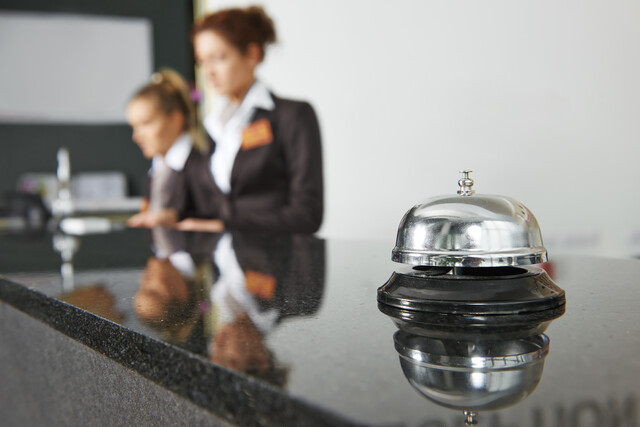If you go to parties and find yourself wondering about the beautifully set and decorated tables, or who created the unique floral centerpieces -- and if you have good communication skills, and jump right in to organize family reunions and fund raisers -- party planning might just be the career for you!
Perhaps you always knew you wanted to be a party/special event planner and are seeking that special niche to help you take the first step to a new and much-in-demand business. The field has blossomed into one of the nation's top jobs, with a rank of number 39, and a prediction of double-digit growth in the coming years.
How do you know for sure if party planning is right for you? Complete the assignment quiz at the end of this article and you'll get an idea of whether you're truly someone who likes to be actively involved and is a first-class organizer:
EXERCISE
1. Would you rather host a party or attend one?
2. Are you more of a visual/seeing person, an auditory/ hearing person, or a kinesthetic/touching person?
3. Would you rather watch a play or perform in one?
4. Do you work well under pressure?
5. On a lazy, snowy day, would you rather read a book or try out a new recipe?
6. Can you multi-task?
7. Can you keep smiling ? no matter what?
8. Are you prone to over-reacting, or are you professional and confident under stress?
9. Are you a problem-solver who can react confidently and quickly?
10. Do you have a decorator sense of balance, style, and color?
Of course you can't be expected to possess all of these traits right off. Many party-planning qualities are learned through good old experience, and others may be outsourced. The questions are intended to give you a broad perspective on how to prepare yourself for the fun and challenging business of a party planner.
A shared industry philosophy is, "You're only as good as your last event." That's why following up with clients with a phone call and sending thank-you notes is so important. You'll always need references when you bid on your next event. If you like the excitement of taking the mundane and turning it into the extraordinary, the great news is you already possess an essential quality for being a professional and successful party planner. In the party-planning business, there is no right or wrong ? only a desire to make the client happy.
Elements of a Successful Party Planner - What You Need
Although party planners design the party and hire personnel to work the event, they must be prepared to step in where needed. Besides personal traits, there are other important skills required of a planner:
- Organizational ability - Take a hard look at your closet and dresser drawers. Do they scream out, "Deal with me," or are you smiling with a sigh?
- Diplomacy - An upbeat and positive attitude is essential, even when the lights go out. Candlelight is romantic.
- Excellent communication skills - a positive and helpful attitude is key to a successful relationship with clients.
- Attention to detail - There are a tremendous amount of details for a party planner to attend to. Eyes should scrutinize a room full circle.
- Ability to make the right decisions - If it takes an hour to select a pair of earrings, then you should consider another career.
- Nerves of Steel - Never allow the client to see you fall apart over the unexpected.
- Creativity - This can mean all sorts of things to party planners, from coming up with missing champagne, to locating the speaker's spectacles.
- People-pleaser - The industry has a proclivity for taking care of people and meeting their needs.
- Flexibility - There are almost always glitches in a plan. The ability to adapt is a great attribute.
Make use of the skills you have and outsource the rest. You may love the look of a professionally decorated table, however, you couldn't set the silverware in all the right places if you had all day to do it; so you hook up with a consultant in the industry who knows how these things are done. How do you find them? This is where networking becomes important to your business. Call another party planner or attend industry trade shows and conferences, such as the International Special Events Society (ISES), and exchange cards with party consultants who also attend these functions. Set up a card file listing the consultants by what they specialize in. Drop them a note (even two sentences will suffice) and say how much you enjoyed meeting them, or thank them for the tip they may have given you. It only takes a minute and invaluable connections can help keep you and your business afloat. Down the road, when you have enough events under your belt, people will be calling you.
Taking Stock of Your Skills and Carving Out Your Niche
Do you think you have what it takes to be a successful party planner? Did we forget to mention high energy, entrepreneurial insight, leadership, and being absolutely driven? Clearly, it takes many different characteristics to become accomplished at party planning or, for that matter, owning your own business.
You may have a talent for certain aspects of the job, but cringe at the thought of other tasks. That's okay. Everyone should learn to set limits and party planning is a limit-setting process. Do well what you can do and generate the support you need to accomplish the rest.
If you are still unsure you're up to the task, try volunteering. Why? It's a great way to learn event planning. Offer to assist the chairperson of a good-sized fund raising event. Follow that person around and sit at all the meetings, help with dealing with all the grunt work it takes to push the event over the mountain. This not only gives you heaps of experience, it helps you to establish your party planning niche.
You may find signing on with an event-planning company is the way to learn party planning from the bottom up. Industry meetings and seminars offer excellent insight into the business. If you already have an idea of the types of parties or events you would like to plan, turn your volunteer efforts in that direction.
If you enjoy the full start-to-finish planning, you may, if time allows, play a larger role in the details, such as designing floral center pieces, guest gifts, and other props. Enjoy yourself when doing this, but it isn't always an efficient way to operate. Whichever you decide, the choice should be cost effective and time efficient. Linens, tables, chairs, china, glassware, silverware and even larger flora and fauna are usually sourced out. This is where building a support network really pays off. No matter how successful you are, you may find yourself up on a ladder hanging swags or, after the party is over, disassembling tables.
If you have talent in entertainment or marketing, shift these skills into your event-planning arena.
The Upside and Downside of Party Planning
As with every job or business, there is always an upside and a downside. Party planning is no different. Let's look at the good news first:
- You have the option of being the boss of your own business. Well, almost. The client may not always be right, and at times, downright emotional, however, you do have to please the person paying the bill.
- You satisfy your creative side. Many people never take the opportunity to do so. Everyone has a creative side, and it's up to you to see that you cultivate it. You work in an upbeat atmosphere. Think Christmas party, birthday party, children's party and the hundreds of party excuses to throw a bash.
- You plan and execute your events. Here is where you can really shine for the social client, such as weddings, birthdays, and bar and bat mitzvahs.
- You have the opportunity to share your sophisticated side. Years ago, a party was no more than a tablecloth and a centerpiece. Today, a certain quality and high level of style are expected. Originality and a magical touch are much in demand.
There is never a dull side to party planning. When Murphy's Law rears its head, be ready for the unexpected:
- It so happens that the limousine vendor, who came highly recommended, sent a limo with a broken air-conditioner in 90-degree heat. It pays to get references, rather than take another party planner's word.
- As exciting as party planning can be, there are times you wish you could just turn-off. Perhaps in the middle of a wedding reception, just when the kitchen is serving the food, you feel a migraine coming on. Take 10 deep breaths and a moment.
- Mistakes are incredibly big, and often quite obvious. Forgive yourself and consider whatever happens, bad or good, a lesson learned.
- Ending the party can be difficult. It all depends on how well you plan. This is as good a time as any to begin breaking down the room. "Sorry but the rental company will be here early in the morning."
- Over-the-top drinkers. Alcohol can become a problem if people drink too much celebratory punch (or champagne). If you haven't planned for a certain person to be on the look-out for this, things could get out of hand. Security is extremely important where a large function is held at a hotel or public facility. Bartenders should be given instructions on when to "cut-off" certain people, and to notify security when necessary.
While this is not always true, many planners attend the party or event to assure things run smoothly. Making yourself available is a great plus with clients who are concerned about something going wrong.
If you specialize in events, such as fund raisers and award ceremonies, you may be asked to handle marketing or accommodations. Making promises you can't keep, or over-committing yourself upsets the client and you. Getting involved in your own business is understandable ? but putting the delicate balance between business and personal is hard to avoid. Having interests other than your business life helps keep you energized and up-to-date on what's going on around you. Joining business organizations will help you keep up with the latest event trends and allows you to network with industry personnel.
Basics of the Party Planning Business
What is Party/Event Planning?
You already have an idea of the types of events and parties people hire event planners to oversee. The list is exhaustive and the events may be business-oriented, or purely social. Whether a party is large or small, planners may manage all or part of the specific tasks related to the event. Here is a sampling of some of the activities planners may be required to supervise:
-
Meet with potential clients, submit proposals and prepare for them agreements and any vendor paperwork required.
-
Suggest themes and ideas.
-
Create party/event designs and decorations.
-
Prepare budgets.
-
Send invitations and keep track of RSVPs.
-
Choose the entertainment.
-
When needed, scout locations.Want to learn more? Take an online course in Party Planning.
-
Negotiate with vendors.
-
Arrange any necessary accommodations for attendees.
-
Order supplies (tables, place settings, linens, glassware, and barware).
-
Facilitate the activities of event personnel.
-
Hire employees or manage party help.
-
Supervise at the site location (this is optional, however, unless you have a great assistant, it's best to be there personally).
-
Plan any necessary transportation to and from the event.
-
Conduct evaluations
The list varies with each individual party and you may be asked to accomplish things out of the ordinary. As long as you're not breaking the law or doing something against your moral mindset, most party planners try to accommodate their clients, at least half-way. Even though, as a party planner, you create beauty and fantasy, it's essential you still understand how to navigate the real world party/event complexities.
Your specialties will depend on your level of expertise and experience. Location also plays a major factor in the kinds of parties you specialize in. If you live in rural Kansas, more than likely your parties will evolve around social events since you may not have a strong corporate presence in your area. New York City is a haven for business events and parties.
Envision yourself attending this splendid evening party. The setting is every party planner's dream. What do you imagine is going on behind the scenes? Depending on the event, there could be servers offering a variety of appetizers, or a plush buffet overflowing with fresh delicacies from the sea, miniature tacos, plump Chinese dumplings, delicacies to tempt the palate, and a variety of pastries to appeal to the sweet tooth. Without a plan, how could all of this been accomplished?
Individuals usually lack the expertise to plan a party of this dimension by themselves. The average person would head for the yellow pages to search for help. Independent planners can step in and give these events the attention they deserve. Imagine the bustling kitchen which is, hopefully, located near the festivities, as servers inch their way up to the front of the line for refills. Trays of champagne, somehow balanced on the bustling floor, busy bartenders serving wine, beer, and other beverages. All the while occupied couples and cheerful groups are engaged in conversation without a clue, or a care, as to what the party/event planner may or may not be going through.
If the party is running smoothly, and the majority do, the planner is exhilarated and, at the same time, holding her breath that this feeling continues. If there are glitches with food, beverage, or entertainment, and obvious problems, the planner is making quick decisions and putting out fires to keep the guests comfortable and unaware of any glitches.
Perhaps the planner and the client are planning an outdoor birthday party for a 10-year-old. It looks like rain. As a party planner, you should have plan "B." The client must be made aware of what the planner suggests if the backyard party is rained out. Certain party games must be improvised or replaced, Additional helpers may be necessary to keep the children busy, and this must all be outlined for the client. The transition from outdoors to indoors should be relaxed and uneventful. Just like the party planner intended.
By now you are likely asking yourself if you should take the leap into party planning. That's okay. If you really want to do something, you should first try it on for size. If it turns out to be a good fit, that's great. If not, move on to something else. Here's an exercise for you to check off that might move you closer to a decision:
EXERCISE
-
Do I have the skills to become a party planner?
-
Do I have management experience?
-
Am I capable of managing a staff?
-
Do I understand the premise behind planning?
-
Do I have business experience and savvy?
-
Do I have an artistic, detail-oriented way of thinking? Do I have the passion for the job?
-
Am I self-motivated?
-
Can I afford to start my own business? If not, from where will I get the funds?
-
Can I commit the time to a new business?
-
Can I comfortably discuss starting my party-planning business with my family?
-
Am I willing to receive the necessary education to make it work?
-
How will I go about learning about the party-planning field?
-
Will I develop a party-planner network? If so, how will I go about it?
-
Should I work with another party planner/business to gain more experience?
As mentioned earlier, it's extremely important to set guidelines for family and friends and not continuously put them on the back burner for the job. At times, it's a great temptation to do so, but before you say,"Sure," remember the other priorities and people who also need you.
Once you decide to become a party planner, you don't have to jump in and do it all right away. Ask friends if you can plan their children's birthday parties. How about helping to organize a family reunion? Become a volunteer and ask for a seat on the planning committee. There are so many ways to get started in the event-planning business. It's not steeped in tradition, so you can always come up with your own touches and ideas.
If you do decide to become a party planner, be committed for the long haul. As with any start-up business, it takes time to lay the groundwork, book the parties, and gain a reputation as an expert.
Learn to accept jobs that are challenging, but where you know you have the confidence to make them a success. Keep your eyes and ears alert to new opportunities to gain business. Always keep a supply of business cards with you. Opportunities arise when you least expect them, and you want to be prepared to follow through with fresh leads. Visit trade shows and conferences to gain theme ideas. Magazines are also a good source.
Once you commit to becoming a party planner, start building your party-planner toolbox and be ready when opportunity knocks.
Prepare Your Home Office or Work Space
With the advent of laptop computers, business can be conducted just about anywhere. Photographs of events, party decorating and favors, proposals, and contracts can be handled on the spot. Even so, there is still a need for record-keeping, incidental equipment, privacy for uninterrupted phone calls, and storage for miscellaneous event supplies. A space of your own is necessary if you intend to run a business, regardless of size.
You can set up shop in a corner of the den or bedroom; however, be prepared to eventually move into a separate room. A desk, phone, fax, and file cabinet are the bare minimum for starters, and you can always shop around for used furniture and equipment. If at all possible, give yourself a space with a window. It's so much better for thinking to let the outside in, rather than staring at an overloaded bulletin board.
When working in a home office, set rules early on. A phone line dedicated to your work curbs the temptation to answer personal calls. A quiet space is critical for planning your business and events. The best scenario is to set up in a space or room that can be closed off by a door. You can always choose to meet with your client in their office, or over lunch in a quiet venue.





























